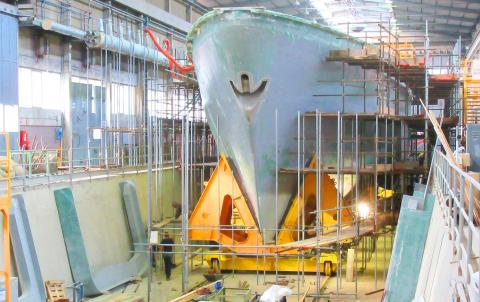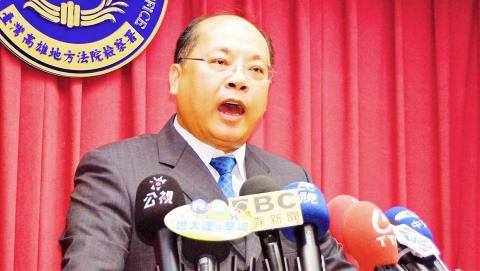Authorities in Kaohsiung yesterday questioned executives of Ching Fu Shipbuilding Co (慶富造船), which is suspected of defrauding banks and using money intended for a Republic of China Navy contract to invest in projects in China.
The Kaohsiung District Prosecutors’ Office questioned 19 people from the company, which was contracted by the navy to build six minesweepers.
Company executives are suspected of securing NT$35.293 billion (US$1.164 billion) in loans under false pretences.

Photo courtesy of Ching Fu Shipbuilding Co
Ching Fu owner and president Chen Ching-nan (陳慶男) and his son, company vice chairman Chen Wei-chih (陳偉志), were later released after posting bail of NT$8 million and NT$5 million respectively.
More than 100 law enforcement personnel, headed by Kaohsiung prosecutors and the Ministry of Justice’s Investigation Bureau, on Wednesday searched 14 locations linked to the probe into the firm and its parent company, Ching Fu Group (慶富集團).
Company executives and managers involved in procurement and financial operations were questioned by prosecutors and were listed as people of interest in the case.

Photo: CNA
Ching Fu Shipbuilding, one of Taiwan’s largest private shipbuilders, in October 2014 won a Ministry of National Defense contract to build six minesweepers as part of the nation’s indigenous ship building and upgrade program.
After securing the contract, Ching Fu Shipbuilding allegedly colluded with a South Korean firm in 2015 and last year to set up three overseas shell companies to launder money, prosecutors said.
Chen Ching-nan and Chen Wei-chih used fraudulent receipts and forged documents from the shell companies to obtain loans from 12 Taiwanese banks, prosecutors said.
The largest was a NT$20.5 billion joint loan from a consortium of nine banks headed by First Commercial Bank (第一銀行).
The first of the vessels to be built according to the contract was a 700 tonne ship, which is being constructed by Italy’s Intermarine SpA, with US firm Lockheed Martin providing support for the mine detection hardware and weapon systems.
Ching Fu Shipbuilding was to build the remaining vessels.
Prosecutors said that Chen Ching-nan and Chen Wei-chih had admitted using false documents to obtain bank loans.
However, they said the firm faced financial difficulties because the ministry had not paid initial installments outlined in the contract.
They said that the situation meant the company was unable to gain US approval to import weapons systems, according to prosecutors.
Allegations of fraud and illegal transfers of funds were raised when investigators found that Ching Fu Group had boosted its listed capital to NT$5 billion, partly from bank loans, and was in talks over a series of joint ventures with Chinese companies.
Investigators said Chen Wei-chih was in Shanghai in June to meet with China MCC20 Group’s (二十冶集團) Zhang Jinxian (張進賢) regarding a joint venture to build luxury resorts and an amusement park on Dongshan Island in China’s Fujian Province.
Meanwhile, the Financial Supervisory Commission yesterday said that despite loan irregularities involving false documents, Ching Fu Shipbuilding had not lapsed in servicing its debt and no domestic banks have filed a complaint about the company.
The commission confirmed that First Commercial Bank had arranged the syndicated loan, of which the shipbuilder had received about NT$15 billion, but declined to provide further details amid an ongoing investigation.
Regarding the allegedly false documents used to secure the loan, the commission said that the banks involved could face penalties for shortcomings in their loan approval procedures and internal controls.
Additional reporting by Ted Chen

ENDEAVOR MANTA: The ship is programmed to automatically return to its designated home port and would self-destruct if seized by another party The Endeavor Manta, Taiwan’s first military-specification uncrewed surface vehicle (USV) tailor-made to operate in the Taiwan Strait in a bid to bolster the nation’s asymmetric combat capabilities made its first appearance at Kaohsiung’s Singda Harbor yesterday. Taking inspiration from Ukraine’s navy, which is using USVs to force Russia’s Black Sea fleet to take shelter within its own ports, CSBC Taiwan (台灣國際造船) established a research and development unit on USVs last year, CSBC chairman Huang Cheng-hung (黃正弘) said. With the exception of the satellite guidance system and the outboard motors — which were purchased from foreign companies that were not affiliated with Chinese-funded

PERMIT REVOKED: The influencer at a news conference said the National Immigration Agency was infringing on human rights and persecuting Chinese spouses Chinese influencer “Yaya in Taiwan” (亞亞在台灣) yesterday evening voluntarily left Taiwan, despite saying yesterday morning that she had “no intention” of leaving after her residence permit was revoked over her comments on Taiwan being “unified” with China by military force. The Ministry of the Interior yesterday had said that it could forcibly deport the influencer at midnight, but was considering taking a more flexible approach and beginning procedures this morning. The influencer, whose given name is Liu Zhenya (劉振亞), departed on a 8:45pm flight from Taipei International Airport (Songshan airport) to Fuzhou, China. Liu held a news conference at the airport at 7pm,

Taiwan was ranked the fourth-safest country in the world with a score of 82.9, trailing only Andorra, the United Arab Emirates and Qatar in Numbeo’s Safety Index by Country report. Taiwan’s score improved by 0.1 points compared with last year’s mid-year report, which had Taiwan fourth with a score of 82.8. However, both scores were lower than in last year’s first review, when Taiwan scored 83.3, and are a long way from when Taiwan was named the second-safest country in the world in 2021, scoring 84.8. Taiwan ranked higher than Singapore in ninth with a score of 77.4 and Japan in 10th with

GRIDLOCK: The National Fire Agency’s Special Search and Rescue team is on standby to travel to the countries to help out with the rescue effort A powerful earthquake rocked Myanmar and neighboring Thailand yesterday, killing at least three people in Bangkok and burying dozens when a high-rise building under construction collapsed. Footage shared on social media from Myanmar’s second-largest city showed widespread destruction, raising fears that many were trapped under the rubble or killed. The magnitude 7.7 earthquake, with an epicenter near Mandalay in Myanmar, struck at midday and was followed by a strong magnitude 6.4 aftershock. The extent of death, injury and destruction — especially in Myanmar, which is embroiled in a civil war and where information is tightly controlled at the best of times —